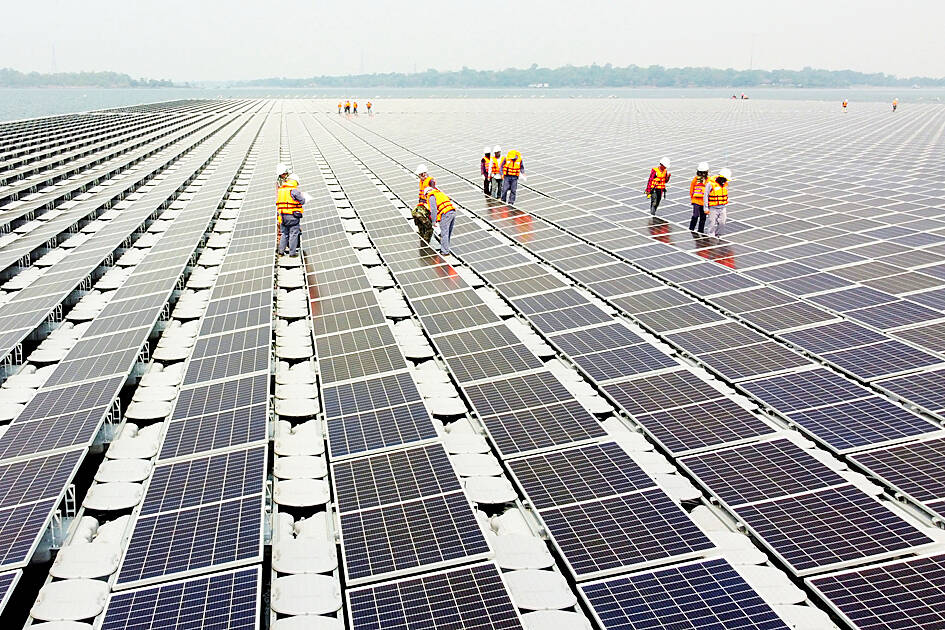The US Department of Commerce set preliminary duties on solar imports from Southeast Asia, after an initial finding that the equipment is benefiting from illegal government aid.
The determination marks an early victory for domestic panel makers who say cheap imports are harming their operations and threatening investments meant to cultivate a US solar supply chain. They asked the government to impose the duties, arguing the equipment benefits from unfair foreign subsidies and is being sold at prices below the cost of production.
The targeted nations provide the bulk of US solar cell and module imports, and the swift imposition of countervailing duties means renewable developers would face higher prices for that equipment right away. For many imports from Thailand and Vietnam, rates would apply retroactively, going back 90 days to early July.

Photo: Reuters
The case marks only the latest bid by US manufacturers to confront overseas rivals, beginning with similar duties on solar imports from China about 12 years ago. Chinese manufacturers responded by setting up operations in other Asian nations that were not affected by the tariffs.
Chinese officials have said new tariffs threaten to slow the speed of the US energy transition and its fight against climate change. The case has drawn opposition from some foreign manufacturers and domestic renewable power developers who argue tariffs could give an unfair advantage to larger incumbent US manufacturers while raising the cost of solar power projects.
“We need effective solutions that support US solar manufacturers and, at the same time, help us deploy clean energy at the scale and the speed we need to tackle climate change and serve growing electricity demand here in the US,” Solar Energy Industries Association president Abigail Ross Hopper said.
“While we recognize the challenging market landscape for domestic manufacturers in the short term, these cases alone will not solve our macro challenges,” Hopper said.
The investigation is set to reach into spring next year — and final rates could be raised, lowered or jettisoned altogether based on the results of the probe.
Under Tuesday’s action, preliminary general rates for companies not specified by the commerce department are 8.25 percent for Cambodia, 9.13 percent for Malaysia, 23.06 percent for Thailand, and 2.85 percent for Vietnam.
Company-specific rates include 14.72 percent for imports from Hanwha Q Cells Malaysia Sdn Bhd; 3.47 percent for imports from certain JinkoSolar Holding Co Ltd (晶科) entities in Malaysia, 0.14 percent for Trina Solar Science & Technology (Thailand) Ltd, and 2.85 percent for certain JA Solar Technology Co (晶澳) entities in Vietnam.
The department is still conducting its initial investigation into claims that solar imports from the targeted countries are being dumped in the US and sold below the cost of production. It is expected to reveal a preliminary finding in that case next month.

SEEKING CLARITY: Washington should not adopt measures that create uncertainties for ‘existing semiconductor investments,’ TSMC said referring to its US$165 billion in the US Taiwan Semiconductor Manufacturing Co (TSMC, 台積電) told the US that any future tariffs on Taiwanese semiconductors could reduce demand for chips and derail its pledge to increase its investment in Arizona. “New import restrictions could jeopardize current US leadership in the competitive technology industry and create uncertainties for many committed semiconductor capital projects in the US, including TSMC Arizona’s significant investment plan in Phoenix,” the chipmaker wrote in a letter to the US Department of Commerce. TSMC issued the warning in response to a solicitation for comments by the department on a possible tariff on semiconductor imports by US President Donald Trump’s

The government has launched a three-pronged strategy to attract local and international talent, aiming to position Taiwan as a new global hub following Nvidia Corp’s announcement that it has chosen Taipei as the site of its Taiwan headquarters. Nvidia cofounder and CEO Jensen Huang (黃仁勳) on Monday last week announced during his keynote speech at the Computex trade show in Taipei that the Nvidia Constellation, the company’s planned Taiwan headquarters, would be located in the Beitou-Shilin Technology Park (北投士林科技園區) in Taipei. Huang’s decision to establish a base in Taiwan is “primarily due to Taiwan’s talent pool and its strength in the semiconductor

Industrial production expanded 22.31 percent annually last month to 107.51, as increases in demand for high-performance computing (HPC) and artificial intelligence (AI) applications drove demand for locally-made chips and components. The manufacturing production index climbed 23.68 percent year-on-year to 108.37, marking the 14th consecutive month of increase, the Ministry of Economic Affairs said. In the first four months of this year, industrial and manufacturing production indices expanded 14.31 percent and 15.22 percent year-on-year, ministry data showed. The growth momentum is to extend into this month, with the manufacturing production index expected to rise between 11 percent and 15.1 percent annually, Department of Statistics

An earnings report from semiconductor giant and artificial intelligence (AI) bellwether Nvidia Corp takes center stage for Wall Street this week, as stocks hit a speed bump of worries over US federal deficits driving up Treasury yields. US equities pulled back last week after a torrid rally, as investors turned their attention to tax and spending legislation poised to swell the US government’s US$36 trillion in debt. Long-dated US Treasury yields rose amid the fiscal worries, with the 30-year yield topping 5 percent and hitting its highest level since late 2023. Stocks were dealt another blow on Friday when US President Donald